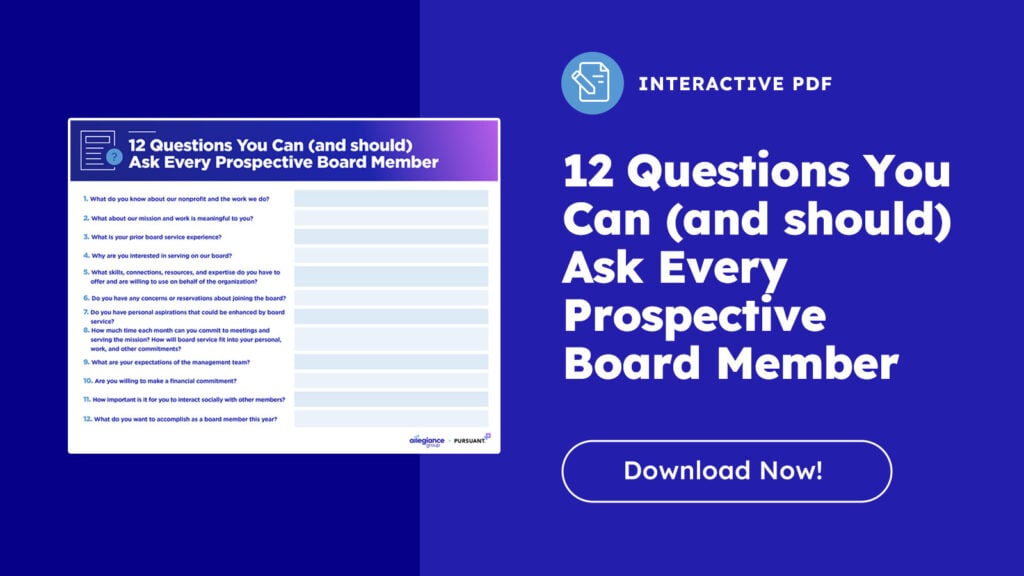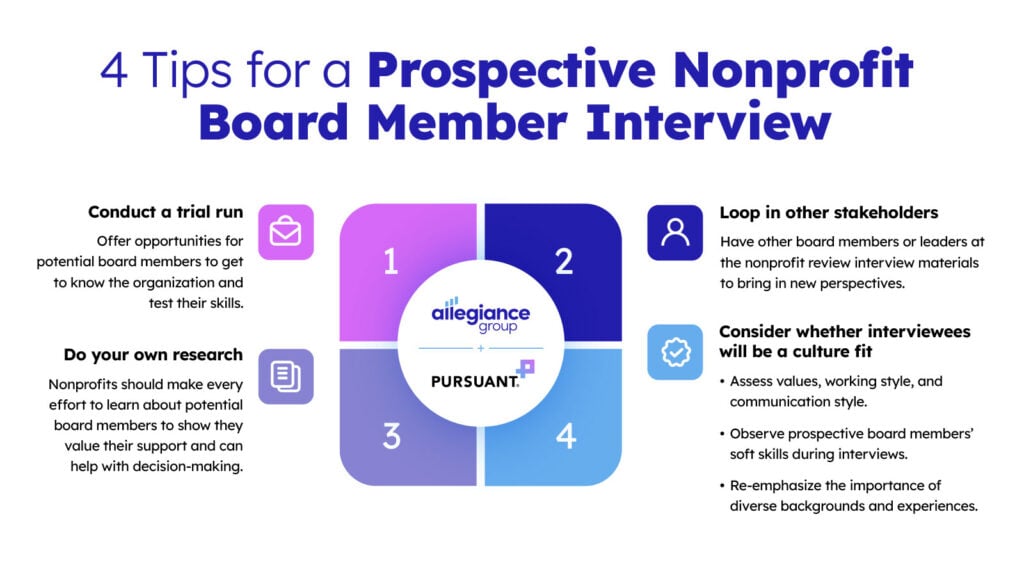12 Nonprofit Board Interview Questions You Need to Ask

Let’s say you’ve identified a potential prospect for your organization’s board. The candidate has a history of giving and community engagement and seems aligned with your mission. Invest the time to interview them before offering them a seat on your board. It’s critical to ask the right questions to ensure a good fit and that the candidate has the capacity to be an active and effective board member – not just a name on the letterhead.
In this guide, we outline the specific questions you need to ask to find quality board members who are dedicated to your mission and why it’s so important to vet each member thoroughly. This information is designed to help you—and the candidate—ensure a good fit before making a commitment.
Want to build a strong community of support around your mission? Let our fundraising and nonprofit marketing experts at Allegiance Group + Pursuant help!
The Role of Nonprofit Boards of Directors
Board members provide high-level decision-making and monitoring of a nonprofit’s overall health without managing or getting involved with day-to-day operations. They can help the organization by using their connections to further the mission and raise funds.
Board member duties typically include:
- Governance
- Long-term strategic planning
- Fiduciary oversight (fiscal management and stewardship)
- Fundraising and resource development
- Hiring and overseeing the executive director/chief executive officer
- Networking
Understand Who to Recruit for Your Board
It is vital to think beyond “what” a board will do and consider “how” it will do its work. With that in mind, a few things should be considered before starting the interview process. Board members’ skills and assignments must align with organizational needs and the members’ interests.
Review each goal of the strategic plan and ask these three questions:
- What are the most important things the board needs to do (versus the staff)?
- Do you have the right board members to do it?
- What skills and expertise are missing?
Skills: Analyze your current board. Make a list of what you need from the board for each organizational goal. This list should include specific skills, areas of expertise, and networks. Recruit to fill those gaps while considering a person’s experience, knowledge, and perspectives. A job may not tell you all you need to know about a prospective board member. For example, if you need help managing a small budget, a corporate accountant may not be as helpful as a small business owner or someone with nonprofit finance experience.
Connections: Board members are often sought for their connections, so look for someone who can set up introductory meetings with elected officials, for example, as opposed to someone who happens to have a government or high-level job. How the board member will use its network to advance the goals of your nonprofit is key.
Diversity: Cast a wide net for potential members with diverse backgrounds and experiences. – not just from the board chair and CEO’s networks. In 2024, 66 percent of board positions in U.S. nonprofit organizations were held by white people, according to Nonprofit Quarterly. Broaden your recruitment efforts by looking to leaders within the communities served by your nonprofit. One organization used LinkedIn to recruit for the types of board members and skills it needed. Additionally, consider establishing a formal recruitment process and make board diversity an ongoing priority.
12 Interview Questions for Nonprofit Board Members
You’ve taken some key next steps to engage them in your mission further, and you’re ready to discuss board service. Congratulations! The stage you are in right now is a lot like being on a job interview, and you need to remember the old saying: interview them as much as they are interviewing you.

Here are 12 questions you can (and should) ask every prospective board member:
- What do you know about our nonprofit and the work we do?
- What about our mission and work is meaningful to you?
- What is your prior board service experience?
- Why are you interested in serving on our board?
- What skills, connections, resources, and expertise do you have to offer and are willing to use on behalf of the organization?
- Do you have any concerns or reservations about joining the board?
- Do you have personal aspirations that could be enhanced by board service?
- How much time can you commit to meetings and serving the mission each month? How will board service fit into your personal, work, and other commitments?
- What are your expectations of the management team?
- Are you willing to make a financial commitment?
- How important is it for you to interact socially with other members?
- What do you want to accomplish as a board member this year?
A helpful hint: Send the interview outline to the candidate in advance.
These questions help you gauge how well a candidate understands your work and future goals and how willing they are to be an active participant – not just a warm body – on your board.
Want weekly fundraising tips straight to your inbox?
10 Questions Potential Board Members Should Be Asking You
A strong board candidate will come to the interview with their own list of questions. They may ask about the board’s weaknesses, your expectations of board members, organizational impact, and financial health.
You should prepare for these questions by having financial information like your current 990, strategic plan, and information about current board members. Like a sales pitch, this is your time to highlight the organization’s value proposition.
Here are 10 questions you should be prepared to answer:
- Who is on the board? How did they get there?
- How long are the terms? How many people are required for a quorum?
- What committees exist? Who is on them? Are they active?
- What does your 990 look like? What is the annual operating budget? What are the sources of revenue and expenses? Is there a deficit? Does the organization have an annual audit, and has it consistently been in good standing?
- Are there any outstanding legal issues with the agency or its employees?
- What are the board’s responsibilities? Is the board adequately staffed with current leaders ready for new roles?
- How does the board assess the chief executive’s performance? Does the board have a practice of annually assessing the chief executive’s performance?
- Does the organization have a strategic plan? How is it reviewed and evaluated?
- How do current programs relate to the mission and purpose of the organization? How does the organization measure its effectiveness?
- How does the organization request and incorporate feedback from program participants?
Remember, recruitment conversations are when you get to highlight your organization’s value proposition. As you interview potential board members, focus on the opportunity and rewards of service. Be genuine when you discuss the support board members receive. Don’t be tempted to downplay your expectations to recruit a noncommittal “big name” board member.
Tips for a Successful Interview

Intentional cultivation and information sharing are necessary before inviting someone to serve on your board. Here is how to make the interview process and recruiting new board members run as smoothly as possible:
Conduct a trial run
- Offer opportunities for potential board members to get to know the organization and test their skills. They could join a committee, whether a short-term ad hoc or standing committee and make sure it’s a good fit for each of you. If they aren’t a great fit for the board, they could serve on an advisory committee with a clearly defined purpose and goals.
Do your research
- Nonprofits should make every effort to learn about potential board members. This shows they value their support enough to dig into their background and can spark questions/conversations that help with decision-making.
Loop in other stakeholders
- Have other board members or leaders at the nonprofit review interview materials. They will likely bring new perspectives to the table and provide helpful feedback.
Consider whether interviewees will be a cultural fit
- Assess values, working style, and communication style to determine whether the candidate will mesh with other board members and stakeholders. Effective boards need a culture where all members are free to ask questions and feel a sense of trust.
- Observe prospective board members’ soft skills during interviews.
- Re-emphasize the importance of diverse backgrounds and experiences. Getting along with other board members doesn’t necessarily mean sharing their exact values/viewpoints.
Finally, always follow up after interviews. Nonprofit leaders should follow up after the meeting with a thoughtful message thanking them for their time and sharing a timeline of the next steps. Prospect board members should be notified within a reasonable period of one to two weeks. All communication with these prospects should be courteous and informative regardless of the outcome. Those who are selected to join the board should be notified about the orientation and onboarding process as soon as possible.
Wrapping Up
Board size and composition should reflect the work it is tasked to accomplish. It’s critical to invest the time and effort to strategically and intentionally build your board so together you can fulfill the mission.